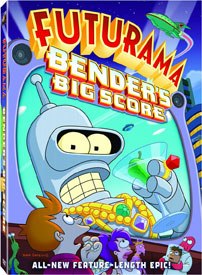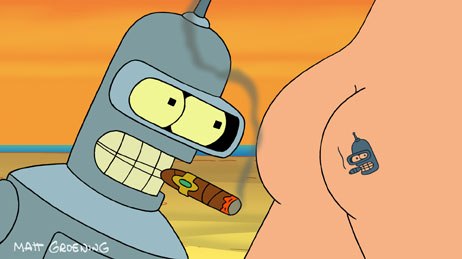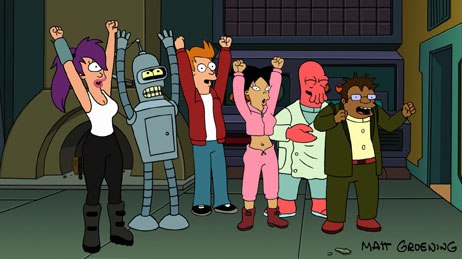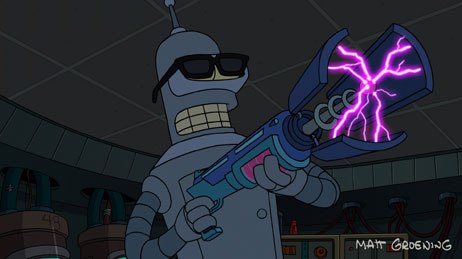Futurama is back, and Joe Strike tells us how the TV series found new life on DVD in the new feature release, Bender's Big Score.

Futurama returns to life four years after the deep freeze of network cancellation as the DTV feature Futurama: Bender's Big Score. Futurama &© 2007 Twentieth Century Fox Film Corporation. All Rights Reserved.
When Philip J. Fry stumbled into that cryonic freezing chamber back on New Year's Eve 1999, he had to wait 1,000 years to be defrosted into the world of the far future. On the other hand, when Futurama itself fell into the deep freeze of cancellation, it only took four years for the show to come back to life. Vociferous, dedicated viewers have saved more than one series from cancellation, but it's an exceedingly rare television phenomenon when audience demand puts a cancelled show back into production.
Family Guy blazed that particular trail, vanishing from Fox's Sunday night schedule in 2002 (after a previous cancellation had been reversed at the last minute), only to return three years later when a succession of comedies flopped in its place. Surprisingly strong DVD sales convinced Fox there was still life (and money to be made) in the show and put it back on their Sunday night schedule, where it continues to thrive.
DVD sales also played a big role in Futurama's return. "Fox Home [Ent.] brought up" the idea of a Futurama revival, says Rough Draft Studios' Claudia Katz, one of the producers of the show's triumphant return as the direct-to-video feature Futurama: Bender's Big Score. "Ultimately there was a business model there from Family Guy [also distributed by FHE] and it started to make economic sense for them.
"We're very grateful they decided it was a good idea. They contacted Matt [Groening] and David [X. Cohen, the series' executive producers] with the idea. I think Matt and David went to the meeting hoping Fox was interested in a DTV feature. When they got there, Fox told them 'we're looking at the numbers and it would only make sense if we can do at least two of them.' Matt and David were like, 'oh, okay, that sounds great.' I think that meeting went better than they expected."

Ultimately Fox's decision to order four Futurama DTV movies was based on the Family Guy business model. A production partner was still needed and Comedy Central's loyalty to the show made the channel a natural fit.
As flush as Fox Home's pockets might've been with Family Guy cash, a production partner was still needed. It just so happened that Comedy Central had defeated Adult Swim in a fierce battle for the next round of rerun rights to Futurama, and both it and Family Guy were still attracting healthy audiences. Once they had the reruns locked up (and scheduled to begin airing in January), working out the financing with FHE for new episodes was "easy," according to Dave Bernath, Comedy Central's SVP of programming. "Getting fresh Futurama content was always very exciting for us."
The deal finally took shape: four direct-to-video movies that will be released by FHE, beginning with Big Score this past Tuesday (November 27), followed by three more at several-month intervals in 2008. Ultimately each of the four movies will be cut into half hours that will run on Comedy Central a few months after their DVD release, with the episodic version of Big Score airing sometime during the 1st quarter of 2008.
The next step was pulling together a new crew to work on a show that had been out of production for several years. "I was really the only person on board with what the series was like," says Dwayne Carey Hill, Big Score's director. Hill had been part of the series from the start, first as a designer, then as director of the fourth-season episode "Obsoletely Fabulous." "It was a big learning curve getting everyone on board and getting them to understand the way Matt and David tell a Futurama story.

One production challenge was pulling together a new crew to work on a show that had been out of production for several years. It was a big learning curve getting the crew and staff to understand how to tell a Futurama story.
"We had a great series and all the DVDs to reference. A lot of our crew had been doing storyboard and design on Drawn Together and were using Futurama as a storytelling model anyway; some of them had even worked on Futurama prior to Drawn Together. It helped them to storyboard the way we liked to begin with. Basically it was a crew we were very familiar with, artists we enjoyed working with."
There was no creative interference from FHE or Comedy Central beyond "getting some standards known," as Katz puts it. "Content-wise it was producer driven, which was really nice. They were, 'here, go ahead.'"
It must've been a dream come true for Groening and Cohen, who fought Fox TV executives for creative control of their show since day one, a battle which undoubtedly contributed to the premature end of its broadcast run. Producing the new episodes for home video and basic cable meant the shows could be scripted with the same freedom enjoyed by South Park and Drawn Together. "The movie is looser than the series," Katz acknowledges. "Network standards have tightened quite a bit since we were on, since the Janet Jackson incident. On Fox you can't show Bart's butt crack any more, something they'd been doing for years. Writing them as DVD movies was a little more liberating -- we see more of Fry's ass than we ever have before."
It was also more challenging. "The film has a bigger, more epic story arc," she adds. "Usually you approach a 22-minute episode as a three-act arc, but they're writing it like a movie you could look at as having four acts. They wrote it like a movie and then sort of backed out of that [to divide it into four episodes]. It's a pretty big challenge and I think they did a great job structurally."

There was no creative interference from FHE or Comedy Central. This was in marked contrast to the series, in which the creators fought Fox TV executives for creative control of their show from day one.
That feature-length structure is built around a complex time-travel story that toys with all the clichés and paradoxes inherent in the genre and builds to a twist ending worthy of The Sixth Sense. If anything, fans of the show may feel the movie's dense plotting shortchanges the zingy dialog and gags they've come to expect. Katz admits Big Score is "a very heavy sci-fi genre story and might be a little lighter on humor in favor of serving the story." For his part, director Hill sees the first movie as "a great fan-based story. The fans will really, really enjoy the return of something they've been waiting for. At the same time, it's a great intellectual story. It kind of introduces all these characters without you having to know who they are -- but it definitely feels like more of a fan script."
Bender's Big Score comes to a definite conclusion -- then introduces a cliffhanger that will be resolved in the second direct-to-video release, The Beast with a Billion Backs. "The next DVD is another great Futurama story, but it's more of a standalone, even though they hook up together," says Hill. "It takes up where the first one leaves off, but definitely in a not-expected Futurama way."
Joe Strike is a regular contributor to AWN. His animation articles also appear in the NY Daily News and the New York Press.







